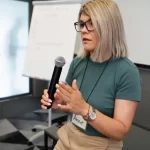The Importance of Community
When I hit my first major roadblock as a founder, I thought I could handle it alone. I spent weeks trying to solve the problem myself, only to realize I was stuck. Then, a late-night call with a mentor changed everything. They’d faced the same challenge years ago and had the perfect solution. That one conversation saved me months of frustration and reminded me of a simple truth: no one builds a great company alone.
Let’s talk about why community matters and how to find the right people to support your journey.
Why Community is Essential for Founders
Building a startup is one of the most rewarding things you can do—but it’s also one of the loneliest. The pressure, uncertainty, and constant decision-making can take a toll. That’s where community comes in.
A strong community provides:
- Support: People who understand the challenges of the startup journey and can offer advice, encouragement, or just a listening ear.
- Perspective: Mentors, peers, and advisors who can help you see blind spots and opportunities.
- Connections: Networks that open doors to investors, partners, and talent.
When you’re surrounded by the right people, challenges feel more manageable, and victories feel even sweeter.
Lessons from My Journey
Early in my startup journey, I underestimated the power of community. I thought building a great product was enough and that asking for help was a sign of weakness. Here’s what I learned:
- You Don’t Know What You Don’t Know: I once spent weeks trying to figure out a legal issue on my own. A quick call to a founder friend not only solved it but also saved me from making a costly mistake.
- Celebrating Wins is Better Together: Startup milestones are more meaningful when shared with people who understand what it took to get there.
- Vulnerability is Strength: Opening up about challenges doesn’t make you less capable—it makes you more relatable. And it often leads to the best advice and support.
How to Build Your Founder Community
Finding the right community takes effort, but it’s worth it. Here’s how to get started:
1. Start Local
Check out local startup meetups, coworking spaces, or networking events. These are great places to meet like-minded founders who share your passion for building.
Pro Tip: Be proactive. Introduce yourself, share your story, and ask others about theirs.
2. Leverage Online Communities
If you can’t find the right connections locally, go online. Platforms like LinkedIn, Twitter, and Slack groups for startups are excellent for building relationships.
Example Communities: Indie Hackers, Y Combinator’s Startup School, or specific founder-focused Slack channels.
3. Join an Accelerator or Incubator
Programs like Techstars, Y Combinator, or local incubators provide mentorship, connections, and a built-in community of founders.
Bonus: These programs often come with additional resources like funding and office space.
4. Find a Mentor or Advisor
Look for someone with experience in your industry or stage of growth. A good mentor can provide invaluable guidance and perspective.
How to Start: Reach out with a specific question or request. Be clear about what you’re looking for and respectful of their time.
5. Give as Much as You Get
The best communities are built on reciprocity. Share your own experiences, offer advice, and celebrate others’ successes. When you give freely, people are more likely to support you in return.
The Power of Peer Support
While mentors and advisors are important, peer founders are just as valuable. They’re walking the same path as you and understand the unique challenges you’re facing.
Peer support can come in the form of:
- Accountability Groups: Small groups of founders who meet regularly to share progress, challenges, and goals.
- Coworking Buddies: People you work alongside, either in person or virtually, to stay motivated.
- Event Collaborators: Other founders you team up with to attend conferences, pitch nights, or hackathons.
How Community Drives Innovation
Some of the best startup ideas come from conversations within a community. When you share your challenges, you invite fresh perspectives and innovative solutions.
Here’s a personal example:
A casual conversation with a fellow founder about customer acquisition led to a partnership idea that doubled our user base in three months. I never would have thought of it on my own.
Your Role in the Community
As much as you benefit from your community, you also have a role to play in strengthening it:
- Be Authentic: Share your real struggles and victories. It builds trust and fosters meaningful connections.
- Show Gratitude: Thank people for their time, advice, and support. A little appreciation goes a long way.
- Pay It Forward: Help other founders when you can. Your insights and encouragement could be exactly what someone else needs.
Take action this week to strengthen your community. Here are three simple steps:
- Attend a local or virtual startup event.
- Reach out to a founder you admire and ask for a quick coffee chat or call.
- Offer to help another founder with a challenge you’ve already faced.
Building a great company takes more than a great product—it takes a village. Your community will be there to lift you up during tough times, celebrate your wins, and push you to be your best.
Remember, startups aren’t just about the companies we build—they’re about the connections we make along the way. So, find your people, invest in them, and let them invest in you.
Because at the end of the day, no founder is an island. And the journey is always better together.



